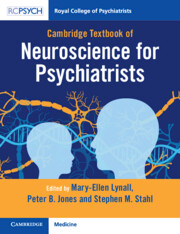Book contents
- Cambridge Textbook Of Neuroscience for Psychiatrists
- Reviews
- Cambridge Textbook of Neuroscience for Psychiatrists
- Copyright page
- Contents
- Contributors
- Introduction
- 1 Cells
- 2 Neurotransmitters and Receptors
- 3 Basic Techniques in Neuroscience
- 3.1 Recording from the Brain
- 3.2 Perturbing Brain Function
- 3.3 Animal Models of Psychiatric Disease
- 3.4 Data Analysis and Computational Modelling
- 3.5 Functional Neuroimaging and Connectivity
- 4 Neuroanatomy
- 5 Neural Circuits
- 6 Modulators
- 7 Genetics
- 8 Neurodevelopment and Neuroplasticity
- 9 Integrated Neurobiology of Specific Syndromes and Treatments
- 10 Neurodegeneration
- Index
3.3 - Animal Models of Psychiatric Disease
from 3 - Basic Techniques in Neuroscience
Published online by Cambridge University Press: 08 November 2023
- Cambridge Textbook Of Neuroscience for Psychiatrists
- Reviews
- Cambridge Textbook of Neuroscience for Psychiatrists
- Copyright page
- Contents
- Contributors
- Introduction
- 1 Cells
- 2 Neurotransmitters and Receptors
- 3 Basic Techniques in Neuroscience
- 3.1 Recording from the Brain
- 3.2 Perturbing Brain Function
- 3.3 Animal Models of Psychiatric Disease
- 3.4 Data Analysis and Computational Modelling
- 3.5 Functional Neuroimaging and Connectivity
- 4 Neuroanatomy
- 5 Neural Circuits
- 6 Modulators
- 7 Genetics
- 8 Neurodevelopment and Neuroplasticity
- 9 Integrated Neurobiology of Specific Syndromes and Treatments
- 10 Neurodegeneration
- Index
Summary
Psychiatric diseases have been amongst the hardest to model well in animals. Nonetheless, important advances in human treatments have followed from animal models. Animal models are used to understand more about human disease where human testing would be impossible or unethical. The species used depends on the question. For example, Drosophila (fruit flies) have a very short generation time, so are suited to genetic studies involving very simple behaviour. Xenopus tadpoles have been widely used to study neurodevelopment. Zebrafish are vertebrates amenable to genetic investigation and have many similarities to mammals. Much psychology research has historically used rats and birds to study more complex behaviour – along with many other species, famously including Pavlov’s dogs.
- Type
- Chapter
- Information
- Cambridge Textbook of Neuroscience for Psychiatrists , pp. 67 - 68Publisher: Cambridge University PressPrint publication year: 2023



